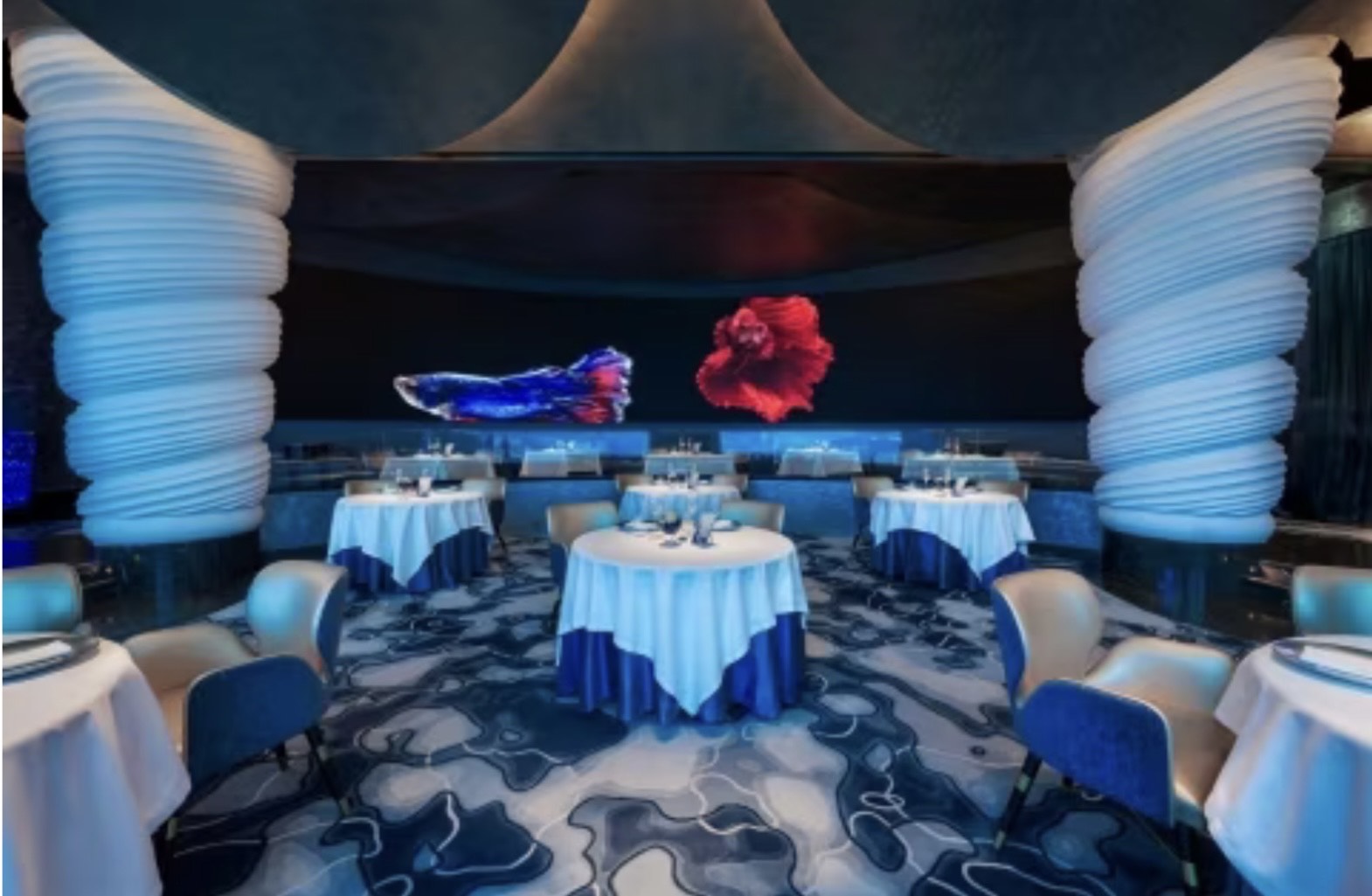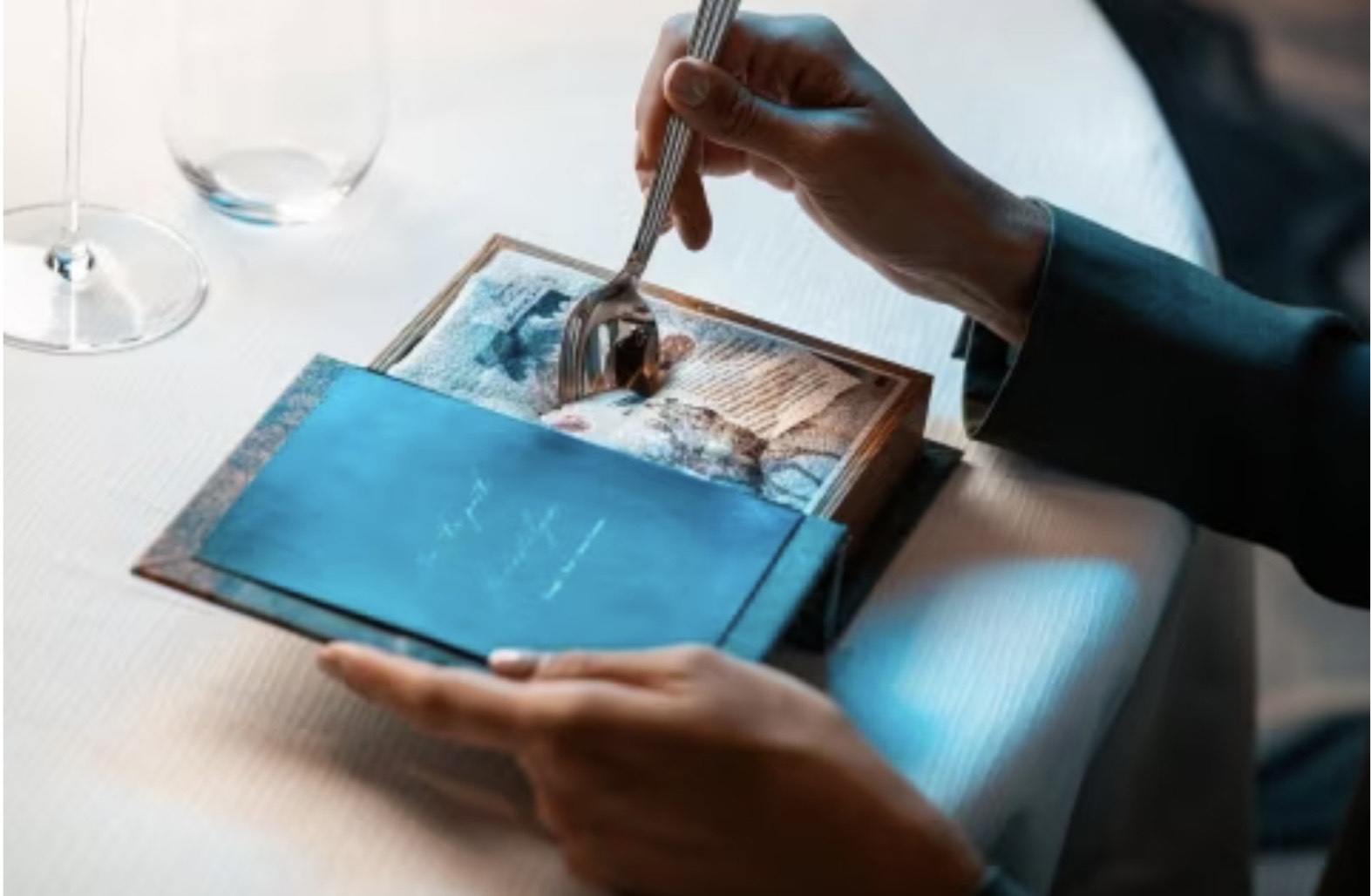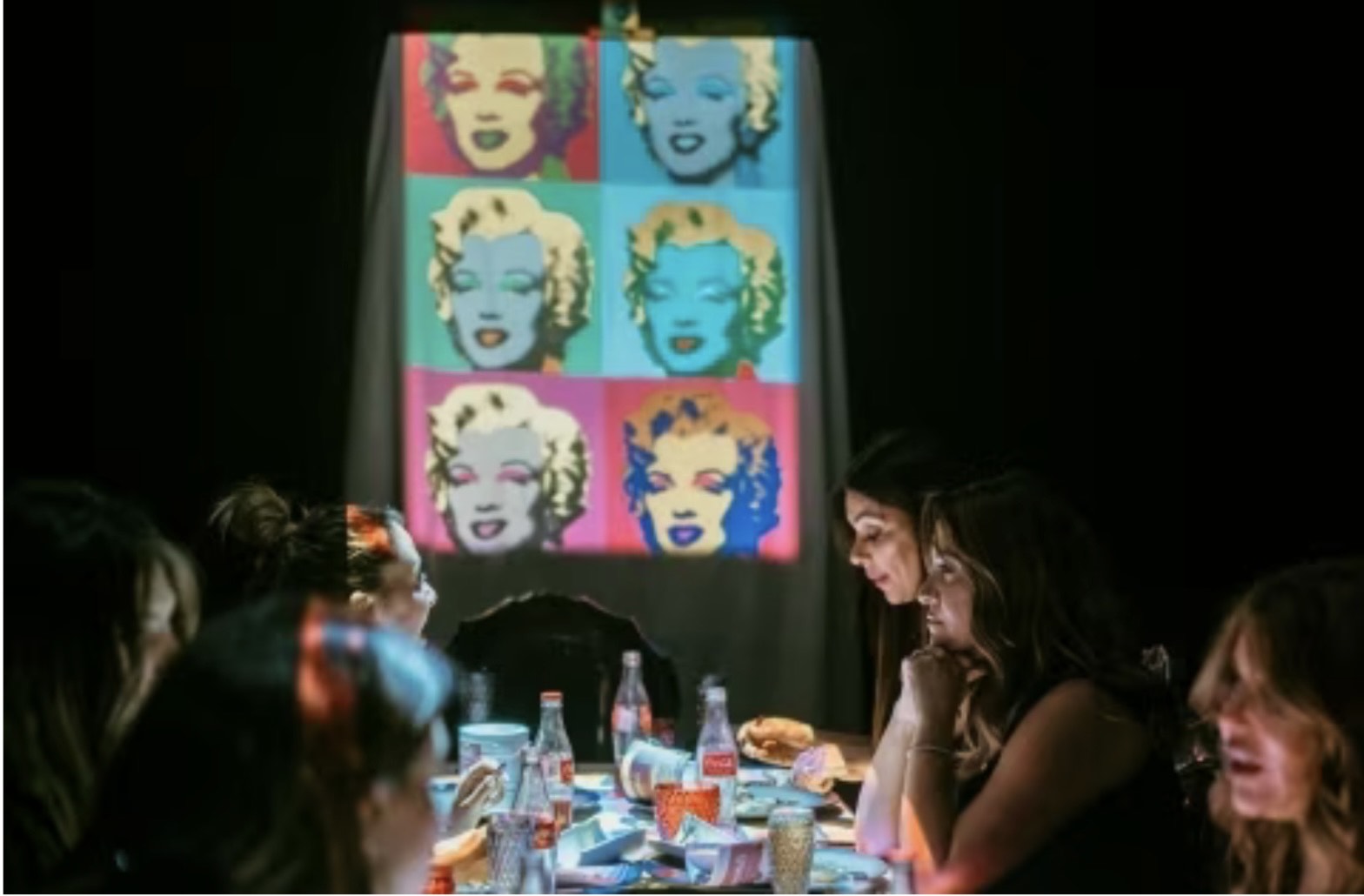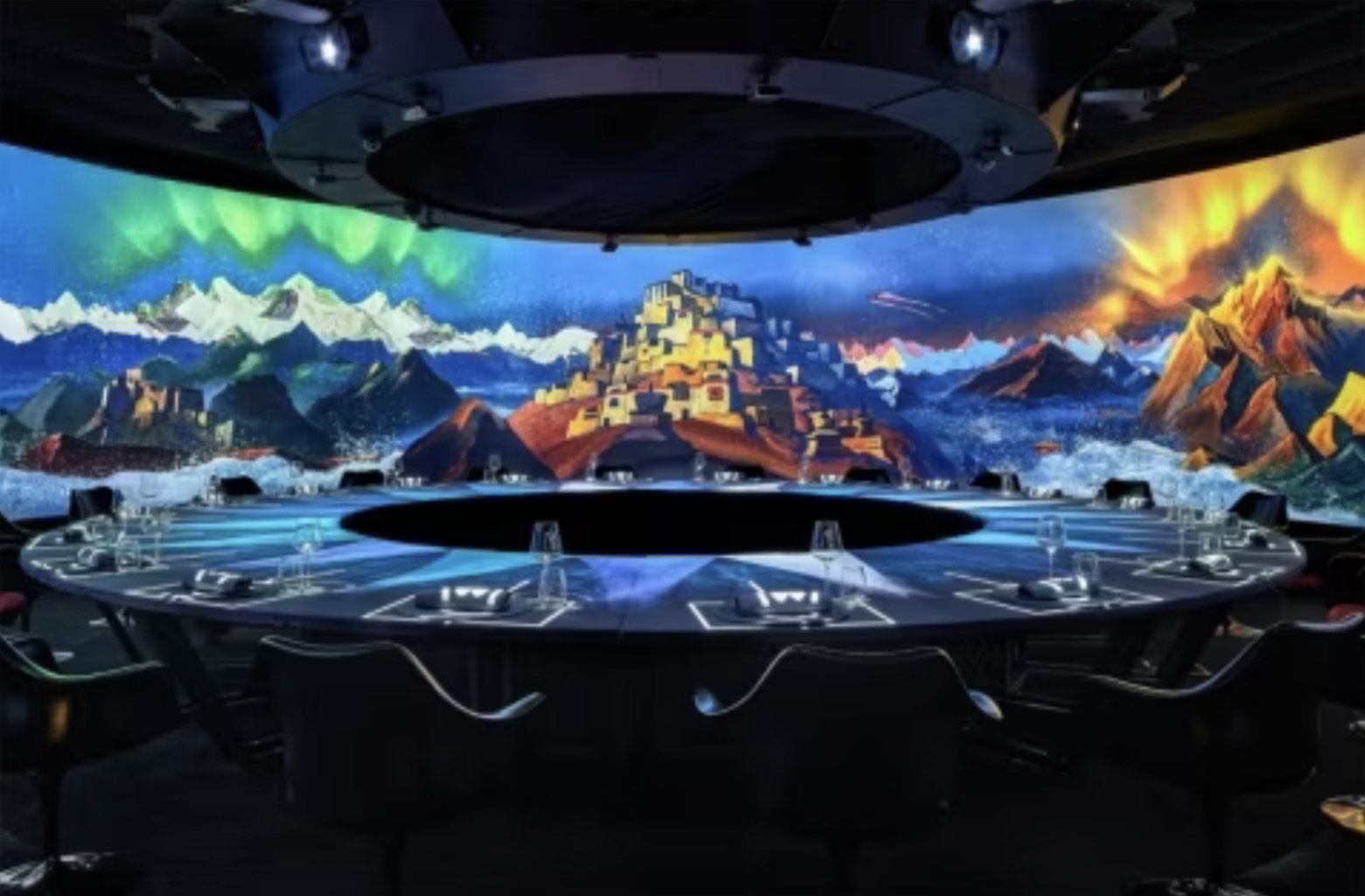Hi there lovely readers, how’s the festive planning going? Heading overseas to revel in spicy dishes and chilled cocktails by a balmy tropical beach? Or Europe for robust dishes and warm toddies under twinkly fairy lights?
On a recent interstate flight I was ruminating on said options while flicking through the latest Qantas mag when I came across an article extolling the uniqueness of three restaurants in Dubai. Well that settles it said I, Europe with a stop over in this fine city. Needs must if I am to write with conviction.
But would I bring these restaurant experiences alive in the same captivating manner as Jenny Hewett who wrote the article in question? Clipped straight from the web, link at the end, read on. And if you add one (or all three), to your agenda, let us know about your experience.
Over to Jenny…
Ossiano, Atlantis The Palm Hotel
 Chef Grégoire Berger’s “11-wave” experience begins with a slap, albeit of the edible variety. The emulsion-like amuse-bouche, presented in a clear, dissolving sachet and aptly named Slap of the Ocean, is eaten in the total darkness of the “plankton” room. “Don’t be scared,” says the hostess with a laugh as she swirls glowing liquid in a glass orb while an automated recording explains the experience. The scene is being set. Next to Atlantis The Palm’s Lost Chambers Aquarium, Michelin-starred Ossiano is the closest you can get to dining in the sea without scuba gear.
Chef Grégoire Berger’s “11-wave” experience begins with a slap, albeit of the edible variety. The emulsion-like amuse-bouche, presented in a clear, dissolving sachet and aptly named Slap of the Ocean, is eaten in the total darkness of the “plankton” room. “Don’t be scared,” says the hostess with a laugh as she swirls glowing liquid in a glass orb while an automated recording explains the experience. The scene is being set. Next to Atlantis The Palm’s Lost Chambers Aquarium, Michelin-starred Ossiano is the closest you can get to dining in the sea without scuba gear.
Berger’s latest menu, Escale, which translates to “stopover” in French, charts the 37-year-old chef’s seaside travels from childhood to now, taking in flavours and anecdotes from Brittany to Japan and Morocco, with bursts of olive wakame and yoghurt and mushroom with dashi.
 After the amuse-bouche, we’re led to the dining room for the 10 remaining seafood courses. A humpback whale and ethereal crimson-red Spanish fighting fish are giants among the 65,000 other sea creatures in the aquarium in front of us, which comes courtesy of a cleverly placed large-scale digital animation at the back of the room that’s reflected onto the glass.
After the amuse-bouche, we’re led to the dining room for the 10 remaining seafood courses. A humpback whale and ethereal crimson-red Spanish fighting fish are giants among the 65,000 other sea creatures in the aquarium in front of us, which comes courtesy of a cleverly placed large-scale digital animation at the back of the room that’s reflected onto the glass.
At one point, the server decants a homemade mulled pinot noir and lights a candle to detect sediment. “I’ll be serving you this candle for your dinner tonight,” he says, snuffing out the flame and chopping the deceptive log of foie gras into four pieces to be spread with sour fruits on brioche.
The surprises don’t stop there. A code is required to unlock a treasure chest containing uni (sea urchin) and seaweed and guests are led to the bar for the mid-meal palate cleanser, a non-alcoholic tequila shot chased with pop rocks and sorbet instead of salt. At the end of the meal, we take home gifts of housemade Japanese dashi in a jar and a booklet capturing chef Berger’s coming-of-age through food.
Seven Paintings, Hyde Hotel Dubai
 Those taught not to play with their food will need to reconfigure their manners at the mind-bending, seven-course interactive experience Seven Paintings. In the ballroom of the Hyde Hotel in Dubai’s Business Bay, you’re invited to paint edible colours onto chocolate to recreate your own Starry Night by Vincent van Gogh and add mock “tears” from a dropper bottle to the Picasso dish of chilled poached prawn, mango and passionfruit.
Those taught not to play with their food will need to reconfigure their manners at the mind-bending, seven-course interactive experience Seven Paintings. In the ballroom of the Hyde Hotel in Dubai’s Business Bay, you’re invited to paint edible colours onto chocolate to recreate your own Starry Night by Vincent van Gogh and add mock “tears” from a dropper bottle to the Picasso dish of chilled poached prawn, mango and passionfruit.
This art-focused meal was conceived by Nadine Beshir, CEO and show producer of Dubai-based Dinner Time Story, and chef Omar Sartwari, who regularly pops up as a projected miniature of himself on the table. The venture, which employs multimedia art, technology and projectors, is Beshir’s fourth. She recently launched a Message in a Bottle experience from the JA Hotel & Resort in Jebel Ali, which takes place aboard the family-friendly boat, Sirene, and has a strong message about climate and sustainability.
The dishes at Seven Paintings are tied back to artworks by Leonardo da Vinci, Banksy, Picasso, Salvador Dali, Jackson Pollock, Andy Warhol and Vincent van Gogh. For the Pollock dish, where guests are encouraged to create an artwork with salad dressing, “we wanted guests to not only understand the art but also to experience it from the artist’s point of view”, says Beshir. “Pollock was about translating movement with music into abstract art. The natural colours of foods like capiscum, beetroot and spinach represent paint and we give our guests the chance to use a paintbrush, listen to jazz and paint on the table.” For extra irreverence, the consommé that accompanies the beef arrives in a Coca-Cola bottle in a nod to the Andy Warhol era.
There’s something underground and a little bit rebellious about this dinner and that’s part of its appeal.
Krasota Dubai, Downtown Dubai
 “I’ve always looked at a restaurant as a theatre,” says Vladimir Mukhin, head chef of Russian-born concept Krasota Dubai. Marrying food with visual art from co-owner Anton Nenashev’s digital art studio, the gastronomic theatre opened in April with a grand, interactive immersion that magically brings to life the works of eight renowned 19thand 20th-century Russian artists, including Marc Chagall.
“I’ve always looked at a restaurant as a theatre,” says Vladimir Mukhin, head chef of Russian-born concept Krasota Dubai. Marrying food with visual art from co-owner Anton Nenashev’s digital art studio, the gastronomic theatre opened in April with a grand, interactive immersion that magically brings to life the works of eight renowned 19thand 20th-century Russian artists, including Marc Chagall.
The restaurant seats just 20 guests on a large circular table in a round room that has the effect of a diorama and plays on every human sense. Mukhin uses texture and complex flavours, such as the tart prickly sea-buckthorn berry, to create sensory moments. The soft crunch of young almonds in the crab with limoo amani (dried lime) animates the crystallised texture of Mikhail Vrubel’s painting technique.
Thanks to 20 projectors (one for each diner), a suite of industrial cameras and optical trackers, dishes such as scallop, finger lime and sea asparagus sit under a whirl of moving digital graphics. Meanwhile, masterpieces, including Ukrainian-born Russian painter Ilya Repin’s All In the Details, are projected around the room.
The Krasota team trained in AI for months to distinguish plates from other objects. “No matter where the guest moves their plate, the effect moves along with it,” says Mukhin. This is no amateur production. There are also costumes to help convey the narrative. Our waiter, Abdul, changes his outfit nine times, at one point appearing at the table wearing a sculptural, iceberg-esque headpiece.
The new show, Imaginary Future, which launched in October, explores eight scenarios of human development to come in the next 30 to 50 years, such as life underwater.
